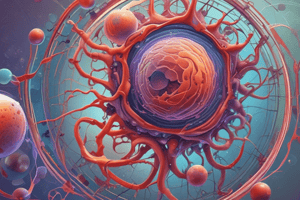Podcast
Questions and Answers
Which of the following cell types provides a waterproofing function for the outer layers of skin? (Select all that apply)
Which of the following cell types provides a waterproofing function for the outer layers of skin? (Select all that apply)
- Keratinocytes (correct)
- Melanocytes
- Langerhans cells
- Merkel cells
A person is suddenly frightened. Which of the following reactions occurs next?
A person is suddenly frightened. Which of the following reactions occurs next?
- Liver cells absorb glucose from the bloodstream.
- Blood vessels supplying the intestines dilate.
- Liver cells release glucose into the bloodstream. (correct)
- Blood vessels supplying skeletal muscles constrict.
Kidneys remove which of the following from the blood?
Kidneys remove which of the following from the blood?
- Platelets
- Oxygen
- Fat
- Salts (correct)
Which of the following structures within a human cell is responsible for recycling materials no longer functional or needed within the cell?
Which of the following structures within a human cell is responsible for recycling materials no longer functional or needed within the cell?
Which of the following are sesamoid bones?
Which of the following are sesamoid bones?
Which of the following chemical compounds prevents the lungs from collapsing?
Which of the following chemical compounds prevents the lungs from collapsing?
The use of an electron would most benefit the study of:
The use of an electron would most benefit the study of:
Which of the following arteries directly supplies oxygenated blood to the reproductive system?
Which of the following arteries directly supplies oxygenated blood to the reproductive system?
Which of the following connects two bones together?
Which of the following connects two bones together?
The shape of villi and microvilli facilitates which of the following?
The shape of villi and microvilli facilitates which of the following?
Which of the following cell types is responsible for the production of soluble antibodies?
Which of the following cell types is responsible for the production of soluble antibodies?
Type I diabetes is a disease associated with which of the following hormones?
Type I diabetes is a disease associated with which of the following hormones?
Demyelination results in which of the following?
Demyelination results in which of the following?
Flashcards are hidden until you start studying
Study Notes
Cell Types and Functions
- Keratinocytes provide waterproofing for the outer layers of skin by containing keratin and forming a protective dead cell layer.
- B-cells are responsible for producing soluble antibodies as part of the immune response to antigens.
- Lysosomes act as recycling centers within cells, containing digestive enzymes that break down unwanted materials.
Physiological Responses to Stimuli
- Upon sudden fright, liver cells release glucose into the bloodstream due to epinephrine stimulation, increasing blood sugar levels.
Kidney Functions
- Kidneys primarily remove salts from the blood, maintaining electrolyte balance.
Bone Types
- Patellae are classified as sesamoid bones, developing in response to strain, and are also short bones.
Respiratory Support
- Surfactant is a critical lung component that prevents collapse by keeping lungs inflated with its lipopolysaccharide structure.
Blood Supply to Organs
- The gonadal artery directly supplies oxygenated blood to the reproductive organs, named testicular artery in males and ovarian artery in females.
Joint Structure
- Ligaments serve the vital function of connecting bones together, providing structural stability to joints.
Digestive Anatomy
- The structure of villi and microvilli enhances nutrient absorption by increasing the surface area in the intestines.
Diabetes and Hormonal Relationships
- Type I diabetes results from the absence of insulin, a hormone crucial for blood sugar regulation.
Nervous System Function
- Demyelination disrupts the propagation of action potentials along nerve axons due to deterioration of the myelin sheath, crucial for rapid signal transmission.
Microscopy and Organelle Study
- Electron microscopy allows detailed examination of cellular organelles due to the short wavelengths of electrons, providing better resolution than light microscopy.
Studying That Suits You
Use AI to generate personalized quizzes and flashcards to suit your learning preferences.




